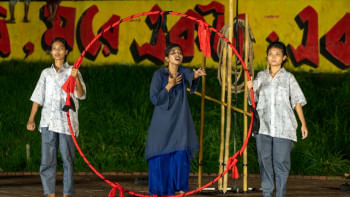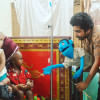‘Invisible Stories’: Puppetry, ghosts, and traditions under one roof

"Invisible Stories", a captivating body puppet theatre performance, has recently debuted at La Galerie, Alliance Française de Dhaka. The show enchanted audiences with its surreal portrayal of the mystical world intertwined with daily life in Dhaka.
Directed by French puppeteer Laurie Cannac, the show featured Bangladeshi artistes Diana Meriline and Md Farhad Ahmed.

This multidisciplinary performance blends storytelling, puppetry, dance, and song, offering a magical exploration of Bangladesh's rich folklore and history.
The story follows two scientists in Dhaka investigating the presence of ghosts in everyday life. Their research soon transforms into a fantastical journey to the Sundarbans, where they encounter the wilderness, spiritual wisdom, and the supernatural forces embedded in the region. Combining humour and horror, the production draws from various Bengali oral traditions, including ghost stories and supernatural elements.

Through the artistes' use of puppetry and physical movement, the invisible becomes visible, offering a glimpse into the unseen forces shaping the world around us. From "tree ghosts" blamed for Dhaka's infamous traffic to the "ectoplasm" holding up the city's walls, the show plays with the supernatural in ways that are both whimsical and profound.
Laurie Cannac has long been inspired by traditional tales, and she saw Bangladesh's folklore as a natural fit for her unique approach to puppetry. "I always work with traditional old tales, so when I was invited to create a show in Bangladesh, I looked into stories popular here," she explained. "Ghost stories are vivid and emotional—they're scary but also funny. And as a puppeteer, ghosts are very inspiring." Laurie's creative process with the actors involved extensive improvisation, especially around body movement and puppetry. The choice to use body puppetry—where human actors manipulate life-sized puppets—was a natural one.

"The world of traditional tales is perfect for body puppets, especially the Bangladeshi ghost world. Body puppets are human-sized, just like ghosts, and their movements mirror human ones," she noted. Laurie also highlighted the similarities between puppets and ghosts, describing both as figures hovering between life and death.
Although grounded in tradition, "Invisible Stories" addresses contemporary issues, creatively linking ancient ghost tales to modern challenges, such as Dhaka's notorious traffic. "It seemed clear to me that old ghost tales still have relevance in everyday life," Laurie remarked. "For instance, I used the idea that Dhaka's traffic jams might be caused by tree ghosts who migrated to the city due to rural exodus." The show also explores the contrast between scientific rationalism and a more spiritual, nature-connected worldview. The two main characters, both scientists, embody these opposing perspectives. As the story unfolds, the more scientifically-minded character is humbled by her experiences in the Sundarbans, ultimately developing a newfound respect for nature and the supernatural.

Laurie shared that this aspect of the story was inspired by her interactions with the people of the Sundarbans. "The strength of their traditional way of life and thinking fascinated me. The Sundarbans are victims of climate change but also part of the solution. I deeply respect the people there," she said.
Both Diana Meriline and Md Farhad Ahmed bring exceptional talent and experience to the production. Diana, a student at Prachyanat School of Acting and Design, has been involved in theatre since 2018, while Farhad has worked with Prachyanat Theatre since 2012 and Jolputul Puppets since 2014.

The technical aspects of the performance, including the use of objects and movement, further enhance the portrayal of the invisible, allowing the audience to engage with unseen forces. This inventive approach enables the performers to explore Bangladesh's rich folklore, encompassing ghost stories from various religious communities.
Beyond its supernatural elements, "Invisible Stories" is steeped in Bangladesh's history. The play references historical ghosts, such as ghost trains, inspired by the tragic convoys during the 1947 partition. These elements highlight the lingering effects of historical events on the present, adding depth to the narrative. The exploration of personal ghosts, connected to the Jungian concept of the collective unconscious, deepens the relationships between the characters. "Puppets are metaphoric—they are living images that spark our imagination. They bring cultural narratives to life and can question society with humour and poetry," Laurie observed.
"Invisible Stories" is set to leave a lasting impact, with upcoming performances scheduled in Chattogram, the Sundarbans, and Dhaka's Brihatta Art Foundation as part of the River Heritage Project. The production has also been selected for the World Festival of Puppet Theatre in France, and discussions are already underway for a European tour.

 For all latest news, follow The Daily Star's Google News channel.
For all latest news, follow The Daily Star's Google News channel. 









Comments